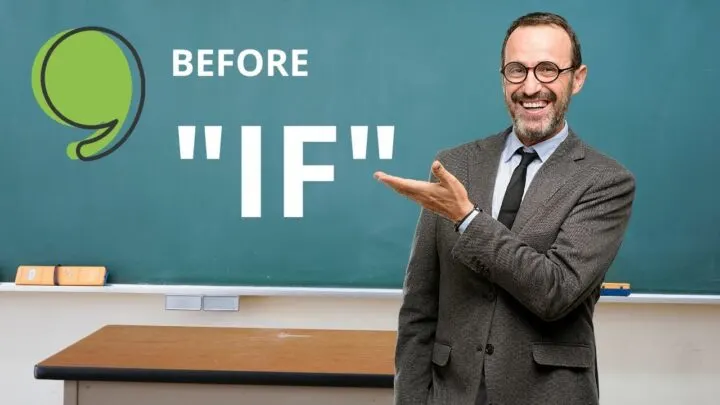When is a comma necessary before “if?”
A comma before “if” is necessary after an introductory remark at the beginning of a sentence. We also need a comma when “if” is used after a mid-sentence transition phrase, such as “for example” or “that is.” We also need to place a comma before “if” when it introduces a parenthetical remark either halfway through or toward the end of a sentence.
Now, let us have a closer look at each of these instances when a comma before “if” is necessary.
Comma before “if”
Oftentimes, a pre-comma is not placed before “if” when it is used in its most basic function, which is to introduce a dependent clause after an independent clause.
This is because, unlike independent clauses, dependent or subordinate clauses cannot stand independently in sentences.
Hence, they need to be directly attached to the statement because of their importance.
However, in more advanced sentence construction, a comma would be generally necessary when inserting any additional remark that helps to improve the meaning of the statement.
These remarks are what we refer to as parentheses in stylistics, whose purpose is to make ideas more interesting to read.
In the spoken language, you can simply think of those side comments or opinions a person utters while explaining something.
Commas are used to set off parenthetical remarks no matter where they appear in the sentence, as they are independently constructed.
Recognizing these parenthetical remarks is fundamental in our comma decisions, especially when dealing with higher-level sentence structures.
When “if” comes after introductory remarks
Introductory remarks are simply parenthetical elements used in front of the sentence, which may either be a word, a phrase, or a fragment.
Using introductory remarks makes statements clearer and easier to digest because they provide contextual background to the upcoming argument.
We may also use connective devices such as conjunctions and adverbial connectors to logically link a series of ideas.
Therefore, a comma is also expected when “if” comes after connectors that are initially placed in the sentence.
When “if” introduces a parenthetical remark midway or at the end of a sentence
As mentioned, parenthetical remarks are sentence elements that are grammatically independent of the main proposition.
Commas aid clarity when representing these auxiliary ideas, and, hence, they are necessary before and after the parenthetical remark.
You can always check whether the remark is parenthetically functioning by removing it from the sentence.
If the remaining words can be considered grammatically well-formed, then you’re dealing with parenthetical remarks.
That said, a parenthetical idea introduced by “if” may also be conveniently placed at the end of the statement.
When “if” comes after a mid-sentence parenthetical remark
We now know that a comma-encapsulated parenthetical remark can be positioned halfway through the sentence.
Therefore, we can already deduce that the closing parenthetical comma should automatically precede “if” when it introduces another idea afterward.

When “if” comes after transition phrases inserted midsentence
Lastly, we may also find transition phrases in the middle of the sentence, which are, again, useful in logically representing our ideas.
Most of these transition phrases bear a particularizing function such as “for instance,” “for example,” and “that is,” which are also parenthetical elements.
The phrases “for example” and “that is” can also be abbreviated into “e.g.” and “i.e.,” respectively, which also needs comma encapsulation.
For more information on punctuating these abbreviations, please click on our other article covering this topic here.
The incorrect comma placement before “if”
Now that we know when to appropriately use a comma before “if,” let’s discuss the circumstances that do not need any.
While the pre-comma is always needed when introducing additional sentence elements, a comma must not be used for essential ones.
This is also the default guideline that we can always refer to when things get confusing.
When the “if” introduces a subordinate clause after the main clause
Subordinate clauses should be treated as essential sentence parts because they cannot stand independently without the main argument.
As subordinating conjunctions are used in creating subordinate clauses, a comma must not come before conjunctions of this kind, including “if.”
Thus, the same rule applies to all subordinating clauses posteriorly positioned in a sentence.
This is the general case except for those that have dual purposes like “while,” “whereas, and “although.”
The rule changes, though, when reversing the structure of the sentence because the comma should be placed at the end of the subordinate clause if it takes the frontal position.
Always bear in mind, too, that parenthetically using if-clauses would always necessitate the pre-comma insertion, even if it introduces a subordinate clause.
When “if” is used as a noun
As observed in this post, “if” has been deliberately and repeatedly used as a noun, either as a subject or an object of the sentence.
Most of the time, we can always improve readability by using quotation marks, italicizing, and bolding.
But, in case these hacks are not in your options, then a comma must never be placed before “if” unless it is, again, parenthetically used.
Also, take note that using “if,” as in the example above, easily invites misinterpretation.
So, this usage has to be avoided as much as possible.
The optional comma placement before “if”
Contrary to what most people think, comma placement rules are not necessarily set in stone.
Yes, there are some rigid conventions like when listing series, but apparently, we, as language users, are free to tweak the general rules every once in a while.
Therefore, stylistic choices may also compel a writer to use commas despite grammatical conventions.
Put simply, a writer may deliberately defy some of the guidelines when there is a reason to do so.
When the “if-clause” is part of a clunky, complicated sentence
Clunky sentences are often formed when we want to express a complicated idea in one sitting.
Of course, this is something that we want to avoid at all costs, especially when the audience is composed of non-technical readers or non-natives.
But if breaking or paraphrasing is not on the list again, the writer may place a comma before “if” to emphasize the following remark.
Frequently Asked Questions on Comma Before “If”
What’s the difference between “if” and “whether?”
The difference between “if” and “whether” is the strength of the implied force of the statement. While “whether” implies a binary choice, “if,” on the other hand, is more obligatory and imposing. Therefore, although “whether” is generally more polite than “if,” it also evokes weaker force.
When should we put a comma before “if any?”
A comma is placed before “if any” if it is parenthetically used to draw emphasis within the sentence as in “What are the grounds of your complaint, if any?” or “Your essay seems to have very few grammatical mistakes, if any, which means you have improved a lot.”
What is an example sentence that needs a comma before “if?”
Here’s a parenthetical if-clause at the end of the sentence: “I’m hoping to ask a couple of questions regarding comma usage, if you don’t mind.” Or you may also insert it midway as in “I’m hoping to ask a couple of questions, if you don’t mind, regarding comma usage.”
Conclusion
The written language is so powerful that it could influence people’s emotional perceptions and, more so, even alter beliefs.
Since conjunctions like “if” and punctuation marks like commas are highly essential writing devices, then we should use them appropriately as much as we could.

Hey fellow Linguaholics! It’s me, Marcel. I am the proud owner of linguaholic.com. Languages have always been my passion and I have studied Linguistics, Computational Linguistics and Sinology at the University of Zurich. It is my utmost pleasure to share with all of you guys what I know about languages and linguistics in general.


